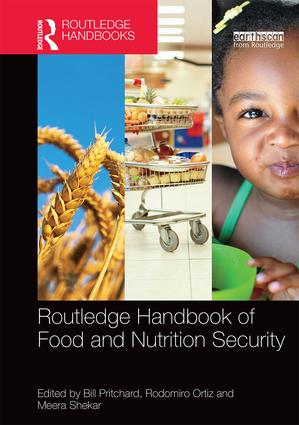The role of agro-ecological and organic food production in providing food for the world
The "Routledge Handbook of Food and Nutrition Security" represents a comprehensive compilation of the current knowledge of food and nutrition security from a global perspective. The potential role of organic and agro-ecological farming to feed the world in the twenty-first century is one the themes in this new publication.

The concept of food and nutrition security (FNS) has evolved and moved to the top of the international policy agenda over the last decade. FNS is a complex and multi-faceted issue, requiring a broad and inter-disciplinary perspective to be fully understood. Whilst individual actors and stakeholders will proceed along specialist pathways, their separate efforts are best leveraged where there are broadly-accepted parameters that define the core dimensions of the issue. The handbook presents 33 chapters in pursuit of this goal.
In the handbook, FNS is conceived in terms of four intersecting themes:
- Availability (the maintenance of sufficient quantities of food available on a consistent basis)
- Access (the ability for individuals in a population to have sufficient resources to obtain appropriate foods for a nutritious diet)
- Utilization, sometimes labelled ‘absorption’ (the capacity for individuals to utilize the food that they can access to ensure good health) and
- Stability (the robustness of food systems over time).
The overarching purpose of this approach is to emphasize FNS as the outcome of varied processes cutting across productive, economic, social and human health dimensions.
Radical changes in the way in which food is produced, distributed and consumed are needed
The effects of human activities on planet Earth are huge and continue to increase as the population grows. The rapidly expanding middle class leads to greater resource use, changed patterns of consumption and increased demands for energy, which needs to be changed.
“The way in which our current global food system is organized seems unable in the longer term to provide the population with sufficient amounts of healthy, nutritious food. Radical changes in the way in which food is produced, distributed and consumed are needed in the near future to decrease the current huge gap between rich and poor and to meet the requirements for nutritious food following increased urbanization and population growth.”
“This failure of our current global food system is a challenge to the human population and it is paramount to analyze the situation in-depth when planning for the future. Even though global per capita food production has never been higher, there is still an estimated 842 million people, or around one in eight people in the world, who are suffering from chronic hunger (FAO, IFAD and WFP 2013). A considerable proportion of the world’s poor and undernourished people lives in rural areas and depends on agriculture (either directly or indirectly) for their livelihoods”. (Routledge Handbook of Food and Nutrition Security (2016): 121.
The magnitude of these challenges provides the context for investigating the potential role of organic and agro-ecological farming to enable the world to feed itself. Are these systems capable of providing a basis for addressing the current multiple challenges which we are faced with in terms of environmental hazards and scarcity of natural resources such as water, pressure on land, and rapid urbanization?
Arguments around organic and agro-ecological agriculture and food production
Together with P. Panneerselvam, Mette Vaarst and Niels Halberg from ICROFS have contributed with the 7thchapter of the handbook.
The aim of the chapter is to present, discuss and weigh some of the arguments around organic and agro-ecological agriculture and food production to evaluate the potential roles of these farming approaches for nourishing the global population.
The authors of this chapter use this phrase deliberately in assessing organic and agro-ecological farming’s role in feeding the world, and the term ‘nourish’ can be quite central. It is a term which is increasingly used by food producers and communities; food security is not just about providing people with calories, but on a long-term basis to give people basis for a healthy life. It is relevant in this context, because the twenty-first century population should have a healthy, sustainable life without hunger, malnutrition, lack of important nutrients or with risk of lifestyle diseases. However, the current situation is that more than one-third of the global population is either hungry or suffering from other types of malnourishment, such as lifestyle diseases and lack of nutrients, vitamins or minerals.
Organic and agro-ecological food production can provide a route for addressing several aspects of this problem. To address a future stable food supply, it is crucial to reverse the current situation of environmental degradation, loss of biodiversity, climate change, water insecurity, and loss of pollinators. However, further promotion of organic and agro-ecological agriculture requires that the complexity of food systems is appreciated. In terms of output per square meter, organic and agro-ecological agriculture often have lower yields compared to conventional agriculture in a strict comparison in the global north, but when wider analytical methods are used, conclusions are more mixed, and the picture looks quite different in tropical areas.
Organic and agro-ecological food production addresses many different issues in local resource use and circulation, which have strong links to complex issues of food and nutrition security. This is the case because organic and agro-ecological farming will often be diversified, either on farm or on community levels (more farms working together and supplementing each other, over a huge area). This provides the population with a range of food items over the growing season.
Furthermore, organic and agro-ecological food production can be shown to improve food producers’ livelihoods in many ways, and through its environmentally supportive production, also enhance future generations’ possibilities for sustainable food and nutrition security. All this said, one of the major future challenges and drivers in a necessary transition of food systems is urbanization, which presents certain challenges but also some opportunities for the future.
Go to The Routledge Handbook of Food and Nutrition Security